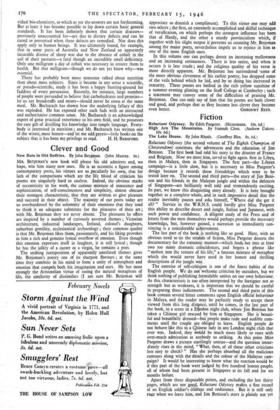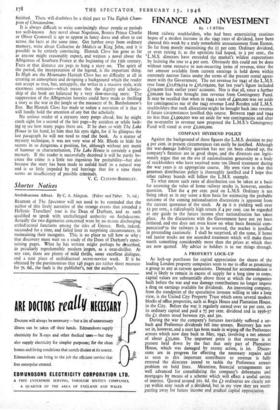Fiction
The Lake House. By John Rhode. (Geoffrey Bles. Ss. 6d.), Reluctant Odyssey (the second volume of The Eighth Champion cfrj Christendom) continues the adventures and the education of Jim Benison. The first book had told his story in the disaster of France and Belgium. Now we meet him, saved to fight again, first in Libya, then in Malaya, then in Singapore. The first part—the Libyan campaign—is a little slow, but it is necessary to Miss Pargeter's design because it records those friendships which were to be tested later on. The second and third parts—the story of Jim Beni- son and his friends in the Malayan jungle and within the defences of Singapore—are brilliantly well told and tremendously exciting. In part, we know this disquieting story already. It is here brought together as a complete whole, and in such impressive detail that the reader inevitably pauses and asks himself, "Where did she get it all?" Service in the W.R.N.S. could hardly give Miss Pargeter this ability to describe desert and jungle, Italian and Japanese, with such power and confidence. A diligent study of the Press and of letters from the men themselves would perhaps provide the necessary knowledge, but, however gained, a narration so immediately con- vincing is a considerable achievement.
The last part of the book is nothing like so good. Here, with an obvious need to tie the strands of fiction, Miss Pargeter deserts the documentary for the romantic manner—which leads her into at least two too many dramatic coincidences, and begets a phrase like "molten into the texture of his life," a fatuous mixture of metaphor which she would never have used in her honest and thrilling descriptions of the jungle war.
The exercise of self-critiejsm is one of the finest habits of the English people. We do not welcome criticism by outsiders, but we think nothing of publishing formidable satires on our own behaviour. As this characteristic is too often interpreted by the foreigner not as strength but as weakness, it is important that we should be careful in preparing these indictments. The second and third parts of this book contain several bitter comments upon English official behaviour in Malaya, and the reader may be perfectly ready to accept them viewed from this long distprice, until he comes, in the last part of the book, to a scene in a LISndon night club, where Jim Benison has taken a Chinese girl rescued by- him at Singapore. She is beauti- ful and beautifully dressed—but people make rude and audible com- ments until the couple are obliged to leave. English people do not behave like this to a chinese lady in any London night club that ever was. Indeed, they would be much more likely to stare with over-much admiration at anybody so striking. At this point Miss Pargeter draws a picture startlingly untrue—and the question imme- diately rises in the mind, "What, then, of all those other criticisms less easy to check? " Has she perhaps absorbed all the malicious rumours along with the details and the colour of the Malayan cam- paign? It would be interesting to know what the reaction would be if this part of the book were judged by five hundred honest people, all of whom had been present in Singapore at its fall and for six months before.
Apart from these disputable points, and excluding the last thirty pages, which are not good, Reluctant Odyssey makes a fine record of an English soldier's courage and endurance. But it is still only 1942 when we leave him, and Jim Benison's story is plainly not yet finished. Them will doubtless be a third part to The Eighth Cham- pion of Christendom.
It is always difficult to write convincingly about people or periods too well-known Any novel about Napoleon, Bonnie Prince Charlie or Oliver Cromwell is apt to appear in fancy dress and often to cut across the facts at the same time. Get further away from ordinary memory, write about Catharine de Medicis or King John, and it is possible to be entirely convincing. Hannah Closs has gone as far as anyone might reasonably expect, and written a novel about the Albigenses of Southern France at the beginning of the 13th century. Facts at that distance are pegs to hang a story on. The spirit of the period, the interpretation of the legend, is the important thing. In High are the Mountains Hannah Closs has no difficulty at all in creating an atmosphere and designing a background which the reader can accept as true, but, unhappily, she writes in a massive style, with enormous sentences—which means that the dignity and scholar- ship of the book are balanced by a very slow-moving story. The suppression of the Albigensian heretics could have made as thrilling a story as the war in the jungle or the massacre of St. Bartholomew's Eve. But Hannah Closs has made so sedate a narration of it that it will hardly hold the attention of any but the scholarly.
No serious reader of a mystery story peeps ahead, but he might catch sight for a second of the last page—by accident or while look- ing tq see how many pages there are. If he does so with The Lake House in his hand, let him shut his eyes tight, for if he glimpses the last paragraph he will not need to read the book. As a matter of mystery technique, it was not very wise of Mr. Rhode to hide his secrets in so dangerous a position for, although without any merit of humour or characterisation, The Lake House is certainly a good mystery. If the reader is successfully deceived it will be partly be- cause the crime is a little too ingenious for probability—but also because the story has been made to unfold itself in a natural way and is so little impeded by red herrings that for a time there seems an insufficiency of possible criminals.
V. C. CI.INTON-BADDELEY.



























 Previous page
Previous page